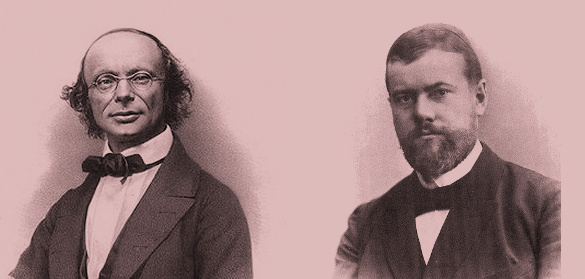Imagine a world where religion and economics are intertwined, where bureaucracy is not just a system but a force shaping social structures, and where individuals are driven by rationality and a quest for meaning. This is the world envisioned by Max Weber, a towering figure in the realm of sociology. His work transcends the boundaries of academic discourse, influencing generations of scholars and everyday people alike.

Image: biographs.org
Weber’s insights have illuminated our understanding of the modern world, revealing its complexities and challenges. His exploration of the relationship between religion and capitalism, the rise of bureaucracy, and the concept of “rationalization” continue to resonate today, providing a framework for analyzing contemporary social issues. This article delves into the life and thought of Max Weber, exploring his key contributions to sociology and their enduring relevance.
The Life and Work of Max Weber
Born in Germany in 1864, Max Weber was a scholar, economist, and sociologist whose influence extended beyond the academic sphere. He was known for his rigorous methodology and his keen observation of social dynamics. Weber’s intellectual journey began with his early studies in law and economics, laying the foundation for his later sociological insights.
One of Weber’s most significant contributions was his concept of “verstehen,” a method of understanding social phenomena through empathy and interpretive analysis. This approach emphasized the importance of understanding the subjective meanings attributed to actions by individuals. Through verstehen, Weber sought to uncover the motivations, values, and beliefs that shaped social behavior.
Key Concepts and Theories:
Weber’s work is characterized by a number of seminal concepts, each offering a unique lens for examining social dynamics. Among his most influential contributions are:
- The Protestant Ethic and the Spirit of Capitalism: This groundbreaking work explored the role of religious beliefs in shaping the development of capitalism. Weber argued that the Protestant values of hard work, frugality, and individual achievement created an environment conducive to economic growth.
- Bureaucracy: Weber recognized bureaucracy as a dominant feature of modern society, characterized by hierarchy, specialization, and formal rules. While he acknowledged its efficiency, he also highlighted the potential for dehumanization and alienation within bureaucratic systems.
- Rationalization: Weber saw modernity as a process of increasing rationality, driven by a scientific worldview, technological innovation, and the pursuit of efficiency. This process, he argued, led to disenchantment and the loss of traditional values.
- Ideal Type: This methodological tool enabled Weber to construct idealized models of social phenomena, such as the “ideal type” of bureaucracy, which served as a benchmark for comparing real-world cases.
- Social Action: Weber classified social action based on the motives underlying it, including traditional, affective, rational, and value-rational action. This framework provided insights into the motivations behind human behavior in social contexts.
The Enduring Legacy of Max Weber
Weber’s work continues to shape contemporary sociological thinking. His theories provide a framework for understanding social phenomena across diverse cultures and historical periods. His insights on the relationship between religion and economy, the impact of bureaucracy, and the process of rationalization remain relevant and insightful.
In the contemporary digital age, Weber’s ideas take on a new significance. The rise of social media, technological advancements, and globalized economic systems present new challenges and complexities that resonate with Weber’s analysis of modernity. For instance, his concept of “rationalization” sheds light on the increasing efficiency and automation in many aspects of our lives, while his work on bureaucracy helps us understand the dynamics of hierarchical structures in corporate and governmental entities.

Image: www.tikalon.com
Practical Applications of Weber’s Ideas
Understanding Weber’s concepts can provide valuable insights for individuals and organizations. Here are some practical applications:
- Analyzing social institutions: Apply Weber’s framework of bureaucracy to understand the dynamics of organizations, from corporate structures to government agencies.
- Recognizing the impact of rationalization: Appreciate the influence of technology and efficiency on everyday life, recognizing the potential for both progress and alienation.
- Evaluating the role of values: Consider the influence of values and beliefs on social action, particularly in navigating complex moral dilemmas.
- Understanding social change: Use Weber’s insights to analyze the forces driving social change, from technological advancements to social movements.
Expert Advice
Here is some expert advice for applying Weber’s concepts in your own life:
1. Embrace critical thinking: Engage in critical thinking about the way you interact with social institutions and the forces shaping society.
2. Cultivate empathy and understanding: Seek to comprehend the different perspectives and motivations that drive the actions of others.
3. Appreciate the complexity of social change: Recognize that social change is rarely linear or predictable, and acknowledge the importance of historical context.
FAQ
Q: What is the core message of Max Weber’s “The Protestant Ethic and the Spirit of Capitalism”?
A: Weber argued that the Protestant values of hard work, frugality, and self-discipline contributed to the development of capitalism. He saw these values as shaping a work ethic conducive to economic growth.
Q: What are the key characteristics of bureaucracy according to Weber?
A: Bureaucracy, according to Weber, is characterized by hierarchy, specialization, formal rules, impersonality, and reliance on written documentation.
Q: How does Weber’s concept of “rationalization” relate to the modern world?
A: Weber saw rationalization as a process of increasing efficiency, driven by technology and scientific progress. This process, he argued, leads to a loss of tradition and a shift towards a more instrumental way of life.
Sociologist Weber
Conclusion
Max Weber’s work continues to be a cornerstone of sociological thought. His insights on bureaucracy, rationalization, and the relationship between religion and capitalism provide a lens for understanding the dynamics of modern society. By engaging with his ideas, we can gain a deeper understanding of the forces shaping our world and navigate the challenges and opportunities that lie ahead.
Are you interested in learning more about Max Weber and his contributions to sociology? Share your thoughts in the comments below.





